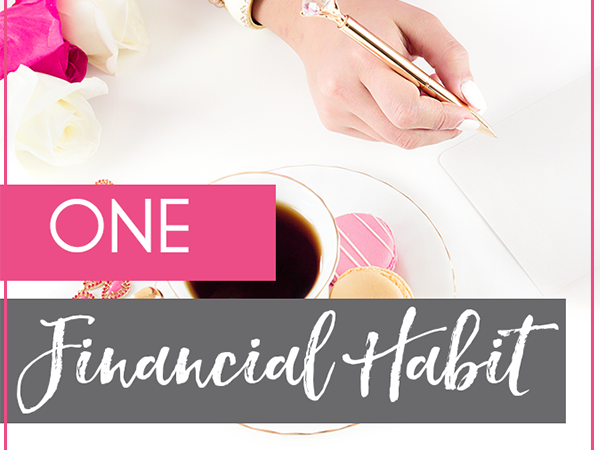You’re probably thinking… “bold statement there Whitney!”
But it’s true!
There is one financial habit that trumps all other things you will do.
This one habit beats out budgeting,
…saving,
*gasp*
…automating your financial life.
It even beats out visualizing your financial goals.
The best part? It’s ridiculously easy to do.
The one financial habit that will change your life is tracking where your money is going.
Why this stuff works
Tracking where your money is going is what Charles Duhigg calls a keystone habit.
In the book the Power of Habit (easily one of my top 3 favorite books), Charles researches why some people see amazing progress and why some just never seem to stick to anything.
The book starts out with a very sad example of a man who has Alzheimer’s. Every day the man and his wife go for a walk around the block. This poor guy has Alzheimer’s so badly that he doesn’t even know where his kitchen is in his own home. It’s heartbreaking.
One day the wife is preoccupied with something and turns around to find her husband gone. She searches everywhere. He’s not in the house. Panicked she runs around the neighborhood and can’t find him. He’s just gone. Nearly hysterical she runs back to her home and begins to call the police. Picking up the phone she pauses as she hears something in the living room.
She turns the corner and her husband is sitting there watching TV like nothing happened.
How the f*ck did this guy find his way home when he couldn’t even point out his living room?
Because he built up the habit. Habits can even beat out Alzheimer’s. That’s the cool and challenging thing! Our brains love to go into autopilot. That’s why we get to work and think “I don’t remember driving here.”
It’s an energy saving tactic that came from the caveman days. Instead of wasting energy remembering how to walk, talk, and function, our brains recognize that our survival depends on being able to strategically think, so that’s where our energy shifts.![]()
 What does this mean for your financial life?
What does this mean for your financial life?
We buy on autopilot.
We go to the mall and make impulse buys on autopilot and don’t even realize it until later. We look at our checking account and think “da hell did I spend so much money on?”
That’s why it’s so important that we track our expenses.
Tracking your expenses is a keystone habit. Keystone habits are more important than any other habit. And when utilized correctly creates success is other areas of your life too.
Keystone habits aren’t directly cause and effect relationships, but they spark chain reactions that allow other good habits to come to life.
Duhigg mentions a ton of different keystone habits. If you want to lose weight, track what goes into your mouth every day. As you do this, you start to realize patterns. And pretty soon you, being the smart cookie you are, immediately see that you ate way too many Reese’s and your peppermint mocha is doing more harm than good. You start making changes and pretty soon you are 10 pounds lighter. And all you did was track what you were eating.
The same thing is true of your financial life.
Simply tracking your expenses every single day will lead to more financial success and results. You start out tracking your expenses and many times end up paying off debt, building up a savings account you only dreamed of before, and finally saving enough money to take that once in a lifetime trip.
How to do this
Okay, so hopefully you are seeing the power of the keystone habit- tracking your expenses.
There are lots of different ways to do this. Many people like to use a notebook and pen and simply write down every time they make a purchase.
Others prefer to save their receipts and update a spreadsheet at the end of the day.
Frankly, it doesn’t matter what your preferred method is as long as you are doing it.
I will caution you away from using a money tracking application such as Mint or your bank’s automatic expense rollup software. It’s not enough to look at something and see a number. You have to manually do it for your brain to connect the dots. We are visual people and when we do the work of manually tracking, we not only feel more emotionally invested, we experience seeing what’s happening firsthand.
So for the next 30 days manually track your expenses.
Tracking your expenses is always more enjoyable when you have a beautiful spreadsheet. That’s why I’ve put together an excel money tracker that you can print off and use or track your expenses directly in Excel.
Download the FREE Money Tracker Template (no email opt-in required).
Let’s recap
- For the next 30 days track all your expenses every single day. If it comes out of your checking account- write that shiz down.
- After each week just observe where you are spending your money. No judgement. Just pay attention to it.
That’s it! Take this exercise seriously. It seems too good to be true, but it’s really not. It will change your life if you put in the elbow grease to follow through on it.
I’d love to hear your experiences. If you have tracked your expenses before, what kinds of things happened to your life? Comment below and let me know.
Forever livin’ debt free,
Whitney

Thank you for sharing this template! As an applied behavior analysis grad student, I totally value (and loathe) habits. When they are good, they are great! When they are bad, they are awful, and even more dreadful to change. With everything I know about behaviors and motivation and data collection, I am shamefully clueless about how to apply it to my money world. I look forward to starting the new year with you and getting all the juicy tips! 😉
Brandy, what a cool background! Behavior analysis is something that fascinates me and I’d love to learn more about.
Start tracking your money- it’s such a great exercise! And be sure to check out some of the courses. There are a couple new ones going live this week.
Whitney, I came across you blog today and LOVE IT! I have been tracking every penny since March 2015. Here are some benefits I have experienced:
1. Sometimes I save money out of laziness (if pay cash on that vending machine, I’m going to have to remember it until I get it written down)
2. It forces me to categorize everything I spend on and pinpoint why I am actually buying it (toy or tool category?)
3. I can look up any expense and know when I bought something
4. I can look up the price I spent at a different store on my phone and know if I’m getting a better deal
5. My husband and I know about eachother’s purchases
6. It makes it easy to know how much sales tax I spent when filling out my taxes
7. I feel responsible
8. I can focus on continually dropping the average amounts instead of staying within a budgeted amount (less stress and longer results)
9. Spreadsheets (even usless ones) make me happy!!
Milly! This is awesome. If you are interested, I’d love to have you guest blog about your experience. 🙂